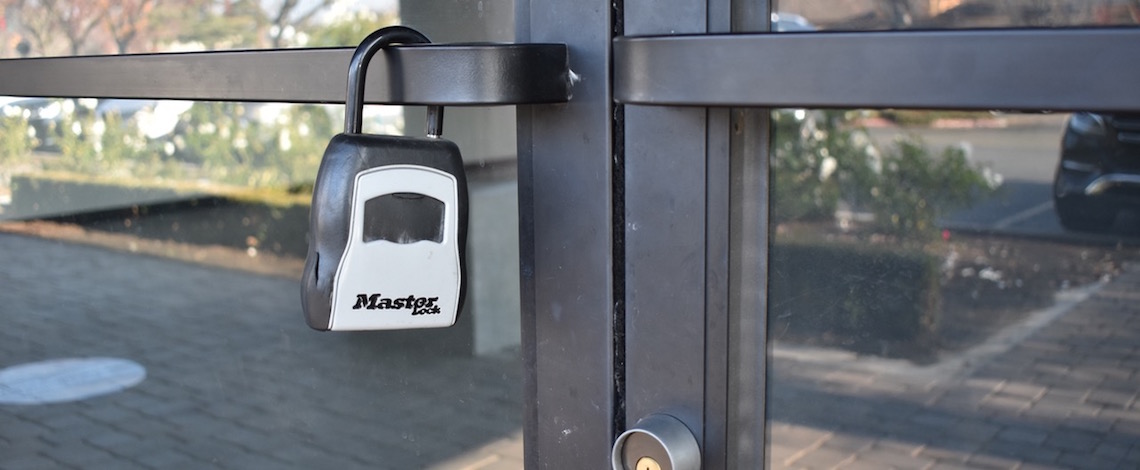
The former Laundry Room boutique in Fresno’s Fig Garden Village sits empty, with a lock available for real estate agents to show the space. Photo by Breanna Hardy
Written by Breanna Hardy
This pandemic year has accelerated the retail industry’s shift to e-commerce faster than any other year. And while that might be convenient for the consumer, it’s not so easy for the tenants, real estate agents and landlords.
Steve Rontell, senior vice president at Colliers International, doesn’t think there will be a crash in commercial real estate, but vacancies have only begun and will not slow down in 2021.
According to a November report released by the National Association of Realtors, third-quarter dollar commercial sales volume for malls and shopping centers declined by 7% and 5%, respectively.
In that same study, the vacancy rate for retail has reportedly increased by 7.1% at the national level, and commercial real estate transactions of $2.5 million or more in the retail sector are down 58% from last year. However, no specific data on the Central Valley’s retail vacancies has been reported.
According to a CoreSight study, nearly 8,500 stores have closed this year, while only about 3,400 have opened.
“It’s going to be difficult to see what’s going to happen in 2021. There’s not going to be very good absorption because people are going to be wary about opening up quickly,” said Steve Rontell, senior vice president with Colliers International in Fresno.
Landlords are going to have to meet tenants’ needs to entice them to stay.
But landlords and tenants alike are up against challenges bigger than rent payments: There is no clear indication to whether restaurants and retail will go back to accommodating 100% capacity any time soon.
Rontell says that some landlords and tenants are being as cooperative as they can.
They see the value of keeping their tenants, even to the point of forgoing some rent revenue.
Lewis Smith, senior vice president of Retail California in Fresno, said lease rates have come down in the last couple of months, and he’s also witnessed shopping centers entice tenants with incentives that would’ve been rare in the past.
“More of the B and C shopping centers have started increasing incentives, such as free rent and tenant improvements,” Smith said.
If it’s a tenant that a landlord really wants, they might offer free rent, but it has to be a competitive tenant who is locked in for a long period of time.
“It’s to get the quality tenants,” Smith said. The monetary return is more shoppers at their shopping center.
But rent is not the only expense tenants have. Insurance, vendors, utilities and inventory are also heavy budget items. In some instances even food is being thrown out for lack of a customer base.
“Real estate has been doing more than leasing. They have become counselors, mediators, therapists. We have taken on a role of trying to assist tenants and landlords that on a temporary basis can help both parties stay afloat,” Rontell said.
Rontell says there is definitely going to be a ripple effect, but only time can show the extent of the damage that Covid-19 has had on the retail world. And it’s not certain how long capacity will be a limiting factor.
“Definitely vacancies are occurring more frequently in the last six months than in the last six years due to the pandemic, and the shutdowns and the switch to online shopping,” Smith said.
The shutdown in the summer wasn’t as bad because it’s already the slow season for most shopping centers. But especially in December, it’s the most crucial season.
“The latest shutdown in December was kind of a death blow to a lot of businesses and restaurants. It really came at the worst possible time,” Smith said.
In 2021, new business might fill spaces up again, but it probably won’t be with traditional retail stores.
“We’re optimistic that new businesses will form, and people will fill up the vacancies within the next year,” Smith said.
The types of businesses that will fill these retail spaces will be more service-oriented tenants that won’t compete with Amazon and online retailers, such as urgent care centers, dentist offices or fitness centers.
But Smith is confident that the shopping center industry will bounce back, given that shutdowns don’t limit tenants.
For those traditional retailers that do want to open up a brick-and-mortar, they might have a better shot with low lease rates.
“There’s always people wanting to start new businesses and wanting to be an entrepreneur. So there’s going to space available for those that can make the best of the opportunity,” he said.
Shopping center owners have mortgages too, and it’s creating a domino effect of money lending.
“They’re not getting all the rent in their shopping center, but yet the banks are not giving them a pass on paying the mortgage,” Smith said.
If landlords don’t produce revenue to cover the monthly expenses, they’re forced to pay their rent out-of-pocket.








